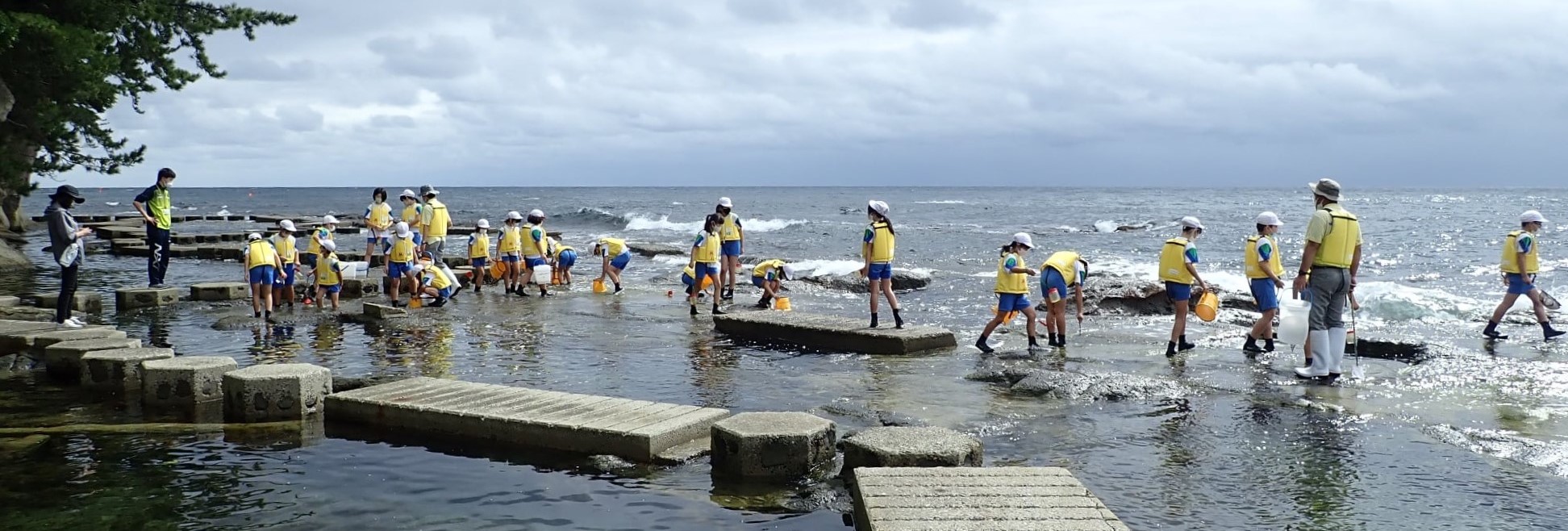English follows Japanese.
石川県能登町立小木小学校は2015年4月から文部科学省の教育課程特例校に指定され、海洋教育「里海科」がはじまりました。その一年後、石川県能登町の他のすべての小中学校でも「里海学習」が開始されました。海洋(里海)教育プログラムは、次の4つのテーマで実施されています。
1.海に親しむ
沿岸環境や地域社会での体験学習を通じて、海に親しみ、海への感受性と関心を育み、海洋生物や海藻の形態的、動物行動学的、または季節的な違いに気付く前向きな姿勢を促進します。
2.海を知る
海洋資源や動物、植物との有機的な関係、人間文化に関するアクティブラーニングを実施し、子どもたちの主体的な学習を促進します。また、海上保安庁の支援を受けて、子どもの海難事故防止を目的とした海難訓練も実施しています。
3.海を守る
海洋汚染や地域の自主的な海岸清掃などの環境問題について学ぶことで、海洋環境を保全する必要性を認識します。
4.海を利用する
定置網でとれるブリの調査などを通じて、漁業や水産資源の有効活用、海運輸送について学び、海が人間と自然の持続可能な共存のためにどのように利用されるかを理解します。また、石川県水産総合センターの支援を受けて、調査船「白山丸」の乗船体験も実施しています。
The Ogi Elementary School was designated as a pilot school for Ocean Education, with a special “Satoumi course” being taught as part of the compulsory curriculum since April 2015. All other elementary and junior high schools in Noto-cho also started “Satoumi learning” one year later. The ocean (or Satoumi) education program integrates the following four themes:
1. Commune with the ocean
Experimental observation in a coastal environment and local communities familiarizes children with the ocean, cultivates their sensitivity toward and interest in the ocean, promotes their positive attitude in noticing morphological, ethological, and/or seasonal differences in ocean animals and seaweeds.
2. Know the ocean
Active learning about marine resources, and organic relationships with animals, plants, and human culture encourages children to study these further. A safety training program for marine activity is also included, supported by the Japan Coast Guard, aiming to prevent marine accidents involving children.
3. Protect the ocean
Learning about environmental issues, such as marine pollution and the purification activities of bivalves, and voluntary beach cleanup for local communities, make children recognize the necessity of maintaining marine environments.
4. Use the ocean
Learning about the fishing industry, effective use of marine resources, and shipping transportation, for example, through an examination of Japanese amberjack caught by a stationary fishing net, allows children to recognize how the ocean might be used to ensure sustainable coexistence of humans and nature. A cruise on the fisheries research vessel, the Hakusan-maru, is also included, supported by the Ishikawa Prefecture Fisheries Research Center.
